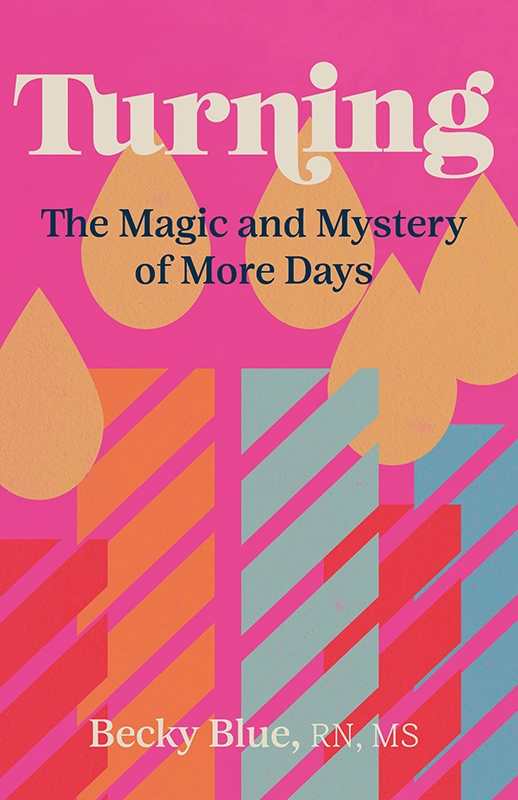Turning
The Magic and Mystery of More Days
Marked by gratitude, Turning is a personalized self-help text that encourages people to envision more for their third acts.
Part memoir and part self-help work, geriatric nurse Becky Blue’s Turning concerns the culture of aging and methods for approaching it without dread.
Though people may think of growing older as a process marked by hearing loss, fatigue, cognitive decline, and declining executive function, Blue’s book argues that people’s ideas and attitudes around aging need to change: they need to expect more. The book’s perspective is that aging is a gift. To support this stance, it draws on decades of Blue’s experience in nursing, lessons from her teachers, and her own reflections from being on the cusp of her sixties.
To support its perspective of gratitude, the book investigates how changing negative attitudes and discouraging beliefs might help to fill people’s third acts with meaning and magic. It includes examples of exuberant living, as with a woman seen celebrating her seventieth birthday with a bike trip across New Zealand and in the vigorous bread-kneading of an eighty-six-year-old woman. And each chapter closes with provocative reflection questions on often hidden or brushed-aside topics, pushing the audience to foster such meaning in their own lives. These include “Is there a new activity you would like to try?” and “Do you have a favorite sense? How does it bring you an abundant life?”
This ranging book speaks most to those who were children during the turbulent 1960s, addressing the era’s cultural myths about aging and its worship of youth. Its work is faith-based, too, and it is laced with quotes from the Bible. Popular lyrics are also incorporated, including those of Pete Seeger. There are also personal reflections on what it means to have longer life spans than previous generations.
Blue’s work is exploratory and freeing throughout, insisting that people should strive for more than they’re told to expect of late life. Practical prompts toward inner exploration encourage fresh thought on one’s own purpose, community, and significance. And the book stretches to consider complementary topics like the role of forgiveness in self-care and the necessity of avoiding a sedentary lifestyle. It forwards general wellness advice, too, such as to engage in moderate-intensity aerobic activities each week, prioritize rest, and stay hydrated. But its core is about cultivating gratitude, and it uses scientific references to support this and its other advice. Its varied work closes with suggestions for sharing the book in a group—and for coming up with one’s own questions for deeper reflection.
Turning is a personalized self-help text that encourages people to envision more for their third acts.
Reviewed by
Kristine Morris
Disclosure: This article is not an endorsement, but a review. The publisher of this book provided free copies of the book and paid a small fee to have their book reviewed by a professional reviewer. Foreword Reviews and Clarion Reviews make no guarantee that the publisher will receive a positive review. Foreword Magazine, Inc. is disclosing this in accordance with the Federal Trade Commission’s 16 CFR, Part 255.

